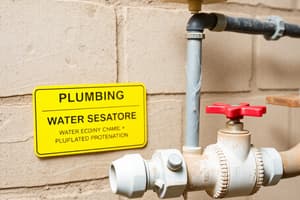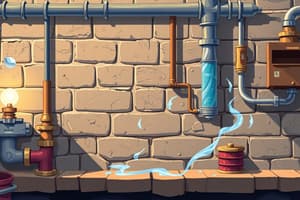Podcast
Questions and Answers
What is the primary objective of plumbing in a structure?
What is the primary objective of plumbing in a structure?
- To install electrical wiring throughout the building.
- To manage air quality indoors.
- To supply water and remove human wastes. (correct)
- To enhance the aesthetic appeal of buildings.
What defines an air gap in a water supply system?
What defines an air gap in a water supply system?
- An unobstructed vertical distance in the atmosphere. (correct)
- A trap designed to prevent backflow.
- A vertical pipe containing pressurized water.
- A connection between two separate water systems.
Which term describes the flow of water into potable supply pipes from another source?
Which term describes the flow of water into potable supply pipes from another source?
- Dead end
- Cross connection
- Back flow (correct)
- Dry vent
What is the function of a relief vent in plumbing?
What is the function of a relief vent in plumbing?
What characterizes a dry vent?
What characterizes a dry vent?
What is a stack vent in plumbing?
What is a stack vent in plumbing?
Which of the following is a common vent?
Which of the following is a common vent?
What is a dead end in a plumbing system?
What is a dead end in a plumbing system?
What classification is given to pipes that convey waste coming from water closets?
What classification is given to pipes that convey waste coming from water closets?
Which type of cast iron pipe is classified as extra duty and used for underground installations?
Which type of cast iron pipe is classified as extra duty and used for underground installations?
What material is used to make asbestos pipe, enhancing its thickness compared to standard cast iron pipes?
What material is used to make asbestos pipe, enhancing its thickness compared to standard cast iron pipes?
Which type of pipe is known to be the cheapest among sewer pipes?
Which type of pipe is known to be the cheapest among sewer pipes?
What is the main advantage of using brass pipes in plumbing?
What is the main advantage of using brass pipes in plumbing?
Which type of pipe is recognized for being extremely durable and resistant to corrosion?
Which type of pipe is recognized for being extremely durable and resistant to corrosion?
What construction material is primarily used in the creation of galvanized steel pipe?
What construction material is primarily used in the creation of galvanized steel pipe?
What is a characteristic of plastic pipes in plumbing?
What is a characteristic of plastic pipes in plumbing?
Flashcards are hidden until you start studying
Study Notes
Plumbing Basics
- Plumbing has two main objectives: supplying water and removing waste.
- Air gap: Prevents backflow of water by creating an unobstructed vertical distance between the water supply and a tank.
- Backflow: Water or other substances flowing from a non-potable source into the potable water supply.
- Riser: A vertical water supply pipe that conveys water to branches or fixtures.
- Standpipe: A vertical pipe used for water storage, often under pressure.
- Liquid waste: Discharge from fixtures, appliances, or appurtenances.
- Relief vent: Provides air circulation between drainage and vent systems.
- Lateral: A secondary pipe in plumbing or a common sewer that doesn't have other sewers feeding into it.
- Main vent: The primary artery of the venting system, connecting vent branches.
- Stack venting: Venting a fixture or fixtures through the soil or waste stack.
- Wet vent: A vent that carries the discharge from wastes other than toilets.
- Dry vent: A vent that does not carry water or waterborne wastes.
- Continuous vent: A vertical vent that is a continuation of the drain it connects to.
- Common vent: A drain from two or three fixtures connected to a single trap. Also known as a dual vent.
- Cross connection: Any physical connection between two separate piping systems, one potable and one potentially contaminated, that allows water to flow between them.
- Dead end: A portion of a pipe closed at one end, allowing stagnation of water or air.
- Solid waste: Waste being discharged by water.
- Liquid waste: Waste coming from various fixtures.
- Waste pipe: Conveys liquid waste from fixtures other than toilets.
- Soil pipe: Conveys waste coming from toilets.
Plumbing Materials
- Acid resistant cast iron pipe: An alloy of cast iron and silicon, commonly used in chemical laboratories.
- Asbestos pipe: Made from asbestos fibers and Portland cement. Twice the thickness of standard cast iron pipe.
- Cast iron pipe: The most common material for drainage systems.
- SV type: Used for building installations.
- XV type: Extra heavy-duty pipe used for underground applications.
- Cast Iron Pipe Varieties: Standard, Single Hub, Double Hub, Hubless.
- Galvanized steel pipe: Made from mild steel, often corroded by alkaline and acidic water.
- Bituminous fiber sewer pipe: The cheapest sewer pipe option.
- Vitrified clay pipe: One of the oldest materials used for sewer lines.
- Galvanized wrought iron pipe: Superior to galvanized steel pipe for plumbing installations, more resistant to acid waste.
- Brass pipe: Expensive, made from an alloy of zinc and copper.
- Copper pipe: Durable and highly resistant to corrosion.
- Plastic pipe: A newer plumbing material introduced in the Philippines.
- Lead pipe: One of the oldest plumbing materials, used by Egyptians, Greeks, and Romans.
Studying That Suits You
Use AI to generate personalized quizzes and flashcards to suit your learning preferences.




